Our editors independently select these products. Making a purchase through our links may earn Well+Good a commission
The surprising thing writer Glynnis MacNicol wishes she’d known about turning 40
Writer Glynnis MacNicol discusses her memoir "No One Tells You This," which explores the truth of what it's like to be childless and single at 40.
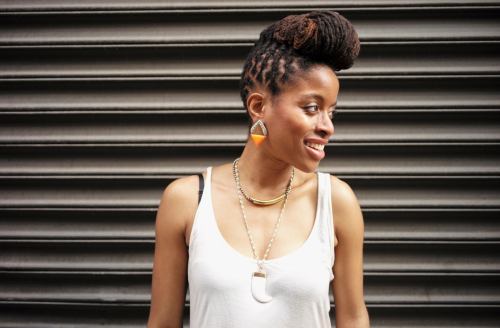
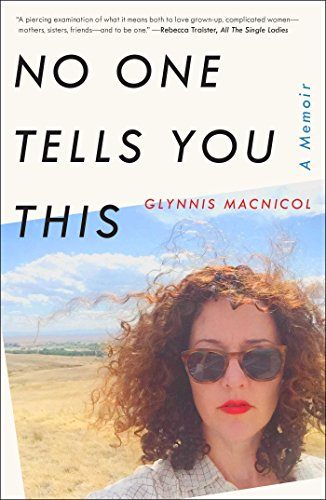
When you’re single and a over 30—and especially over 35—any time a piece of pop culture featuring an unmarried, childless woman of a certain age emerges, everyone you know sends it to you. Why? Because it happens so rarely, the phenomenon feels remarkable. (Bigfoot, Nessie, and I play bridge on Thursdays…)
So when TheLi.st co-founder Glynnis MacNicol’s new memoir No One Tells You This hit shelves, several fellow singles sent it my way. But this time, the book was circulated with exclamatory notes about how MacNicol writes about being single and childless in your 40s…but without the usual soul-crushing regret and depression popularly associated with the scenario. Reading No One Tells You This felt like sweet relief from all the fear-mongering about the clock running down on my ability to have a fulfilled life.
Below, I unleash all of my thirty-something anxieties on MacNicol in the hopes of further comfort (or at least commiseration). She delivers on both and explains why having this conversation is so important.
Keep reading to find out why MacNicol was surprised by what comes after 40.
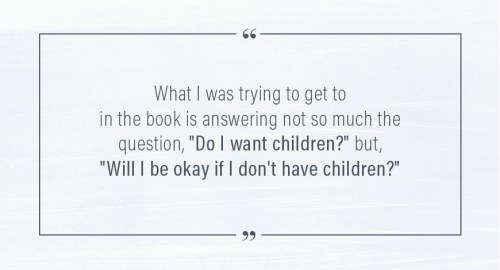
As women, we’re taught to expect our stories to turn to marriage and children at a certain point in time (namely, before 40). As I’ve gotten older, however, I’ve started to question whether I really want kids or if I just think I *should* want them. Do you have any advice for women navigating this decision (as you did)?
I think the answer to the children question is different for everyone. And just because I wrote the book and feel comfortable with my life doesn’t mean I’m not constantly walking up to that line myself, where I think, “Are you really sure?” Part of what I was trying to get to in the book is answering not so much the question, “Do I want children?” but, “Will I be okay if I don’t have children?” Because I think that’s more specifically what I was struggling with. I’m still in that conversation with myself as there are a lot of ways to have children in your life, but I don’t know there’s a clear answer except to be very honest with yourself.
Also, I do think we get caught in the idea of waiting for the right person to show up, and I tried to disentangle myself from that thinking. I was like, “Do I want a child badly enough to have one on my own?” Let’s really look at the realities of what that is, because we don’t tend to think of children, we think of babies, and the reality of children is long and complicated and wonderful and difficult. So I think be as reality-based about it as you can possibly be.
I’m also very against making decisions based on what I’m worried I might regret in 20 years. A lot of the discussions we have around children are, “Oh, 20 years from now you’re going to be so sorry you didn’t have kids.” Should I do this now because one day I’ll be sorry I didn’t do it? That’s not… you can’t make decisions based on fear.
When you say, “Will I be okay if I don’t have children?”… I worry I’ll be sad because other people will think I’m sad. So it kinda becomes about my self-consciousness about what other people think. Do you experience that?
Less now. Also, Instagram and Facebook didn’t exist for me until I was into my thirties, so I was able to live my life outside of that awareness of what other people were doing, and not even what they were doing but what they were performing—we all know that social media is an unreliable narrator, but that doesn’t keep if from affecting us. I’m certainly not immune to it, but it affects me in different ways because I was so much older before those things came into play.
Someone asked me today what my number-one piece of advice was in life and it was “get off your phone.” You’re never going to be satisfied with your life if you’re living it based on what other people are thinking. And the truth is, most of the time, people aren’t thinking about you.

The social media aspect of it is bigger than I’d like to admit. Sometimes I just want to have a baby because I want the picture on Instagram that will make me the same as everyone else. And that’s such a messed up way to think about it.
It’s not, though. It’s totally normal because there’s a language around that. Instagram is a language, there’s a language around these experiences and we’re taught to value this above all else. The earlier version of this was women’s magazines, which were just as pervasive in supporting this narrative. Women are used to seeing versions of their lives performed for them and the drive to fit in and be able to participate in that is very understandable, it’s very human.
One of the things I also struggle with is that feeling that it’s not a decision—like it’s out of my control and I may wake up and find I’ve missed my chance to have kids. So, I’ve tried to be more “proactive,” I’ve tried to force myself to date and also to date in a way I’ve never dated before, which is with a goal (babies!). It’s been a disaster. I’m wondering if you experienced that at all.
One of the things that happened when I turned 40 is I stopped thinking about dating as a solution. Which isn’t to say, “Oh, I never want to fall in love again.” But I stopped thinking of dating as finding the guy I want to build a life with. I have already built a very solid, fulfilling, complicated life. I am not on the hunt for someone to complete it. If I find someone that enriches it—that’s a different story. Understanding that I’m quite satisfied with the way my life is now and that I’m okay without children really shifted how I viewed dating and relationships.
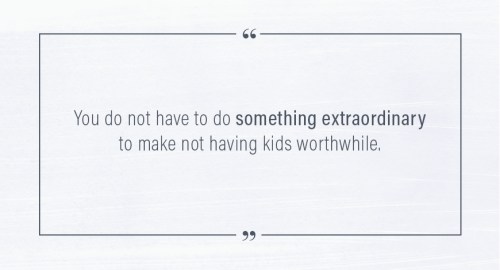
My life is similarly very full, but I do struggle with feeling stuck in this one part of my life because we define ourselves by these phases: college, marriage, kids, etc. And I think if I just had a kid I would move into the next phase and it would feel good. Does that ever go away?
We have pretty narrow narratives around women’s lives. It’s get married, have a kid, raise the kid… and then we stop talking about you. One of the things I struggled with right around when I turned 40 was that because I was single and I didn’t have children there was absolutely no blueprint for how to live. We have no ritual around a woman’s life outside of marriage and babies, and I think that can be both freeing and overwhelming—and I remain overwhelmed by it at times. How do we think about the arc of my life if I don’t have these things to celebrate it? I think as more women step away from marriage and motherhood we’re probably going to start creating new rituals on our own, but they don’t exist right now.
I don’t know if you’ve read the book Motherhood, but there’s a quote in it where the author Sheila Heti says something to the effect of, ‘If you’re not going to be a mother, you better know what you’re going to achieve instead, and it better be big.’ Do you feel that pressure at all?
No, but I understand where that’s coming from a little bit, the older I get. We do emphasize motherhood as the be-all end-all. And for mothers, that’s just as suffocating as for people who don’t have children. So I think we do get pushed into this idea that if you’re not going to have children, which is [seen as] the main thing women can accomplish, you better find something really really big to make up for it. Which is bullshit.
You do not have to do something extraordinary to make not having kids worthwhile. You can actually just enjoy your life. And the fact that that seems like a radical statement, the fact that my book to some people seems radical, is not a measure of anything except that it’s so new for women to be able to make their own decisions that it feels radical.
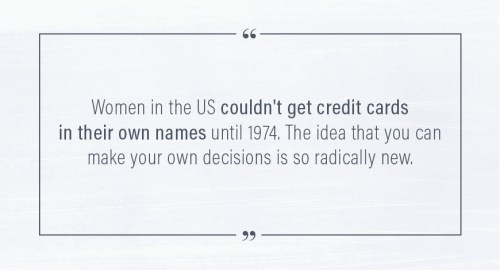
There’s a quote in that vein from your book that I put on my Instagram stories, and I got so many responses from single women who were like, “Yes!” It was: “I was also a relatively modern phenomenon: a woman in charge of her own life, who could do what she wanted.” It’s so true, and we don’t really think about it…how relatively new this all is.
It’s hard to remember that most women haven’t been able to do whatever they want for all of history. I’ve said this so many times but I think it bears repeating: Women in the US couldn’t get credit cards in their own names until 1974. The idea that you can make your own decisions is so radically new. I don’t think it’s a coincidence there are chants of “lock her up,” at presidential rallies; I don’t think they’re talking about Hillary Clinton. I think we’re in the first wave of women who grew up being able to determine what they want their life to look like, and that is shifting power structures so dramatically that it’s alarming to a lot of people who are used to being in power. So I do think it’s beneficial for women who feel outside the narrative or ashamed or panicked to just remember, you’re not crazy. It’s just that this is new.
Switching gears a bit, part of where I feel like Sex and the City lied to me about being single in your thirties and beyond, that I get bitter about, is that my friends don’t go to brunch with me anymore. Metaphorically and literally. They have kids and other priorities. I’ve felt left out and a little lonely as a result, because I don’t have my core group of friends anymore. Do you have any experience with that?
Of course! It felt like a grieving process. And one of the things that was so difficult about it is that nobody recognizes how difficult it is when all of your friends’ lives changes. I thought of it like legs on a table—it’s like losing three legs from a table and you’re left trying to hold it up on your own…and there’s no recognition of those life shifts. I say in the chapter [in the book] where my friend got married that I thought it would be more appropriate if I walked her down the aisle because who’s really giving this person away? It’s not her father. It’s her friends that are making the shift in their lives when she moves on. There’s a grief involved in it that we don’t recognize, and sometimes the recognition is the thing that makes it a lot easier to deal with. There’s a reason we have funerals. It’s to recognize loss.
The years between 37 and 40 for me were really tough [for this reason]. I started making friends in different age groups. I feel like up until my mid thirties I had one solid group of friends and when they all moved away and got married and our lives shifted so dramatically I started making sure I had different groups of friends at different places and different ages. And I will also say… your friends will come back to you. Those first years of marriage—especially if there are kids—they’re brutal for everyone. But I will say they do come back. And then you’ll have to make time for them because they’ll be lonely ones, which is usually what happens.
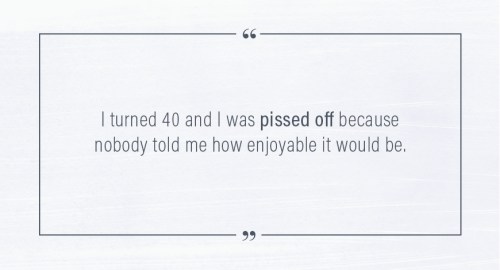
The book is framed specifically around you turning 40—the scary age where women are taught they fall off a cliff. What was the most unexpected part of that experience?
How great it was. I turned 40 and I was pissed off because nobody told me how enjoyable it would be. I know people say this, and you hear them say it and you think it’s bullshit, but I love this age. I would not trade this in for anything. And most women I know who are my age 100-percent agree with me. It’s just fantastic.
Thirty-eight and 39 to me were so intense, and that probably contributed to how much I enjoyed being 40. I felt relief from a lot of expectations and clocks and timelines, and I felt very powerful. In my late 30s, I felt very disempowered because, as you say, the countdown was on and holy shit what happens to me if I don’t get these things lined up. The answer is you’re going to be great. Nothing is over and things will be wonderful and you’ll feel so much better about yourself.
Honestly, hearing that reassurance makes me feel like crying. There are so few places I can hear that from.
It’s really hard when you don’t have a cultural narrative to point to. There’s a reason we’re still talking about Sex and the City 20+ years later. It’s not a coincidence. We are lacking in these bigger archetypes and stories so I really just wanted to put a story out there that was more than me telling friends it was going to be okay.
Thank you for giving me a reason to look forward to turning 40—even if it’s just to be done with this part, haha.
Well, enjoy what you have right now. Enjoy your skin. Enjoy your metabolism. I wouldn’t say it’s all terrible. But it’s definitely intense, and it’s not your imagination. Women are always told it’s “all in their head.” It’s not all in your head.
Not quite as confident in your single status as MacNicol? Try these science-backed tips for being happier sans partner. But also, maybe don’t do this gross thing single people do?
Sign Up for Our Daily Newsletter
Get all the latest in wellness, trends, food, fitness, beauty, and more delivered right to your inbox.
Got it, you've been added to our email list.










